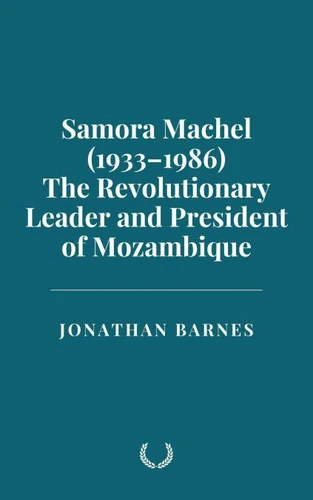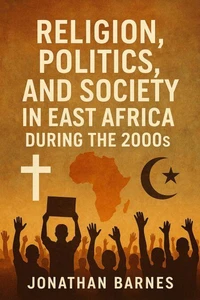Samora Machel (1933–1986): The Revolutionary Leader and President of Mozambique
Par :Formats :
Disponible dans votre compte client Decitre ou Furet du Nord dès validation de votre commande. Le format ePub est :
- Compatible avec une lecture sur My Vivlio (smartphone, tablette, ordinateur)
- Compatible avec une lecture sur liseuses Vivlio
- Pour les liseuses autres que Vivlio, vous devez utiliser le logiciel Adobe Digital Edition. Non compatible avec la lecture sur les liseuses Kindle, Remarkable et Sony
 , qui est-ce ?
, qui est-ce ?Notre partenaire de plateforme de lecture numérique où vous retrouverez l'ensemble de vos ebooks gratuitement
Pour en savoir plus sur nos ebooks, consultez notre aide en ligne ici
- FormatePub
- ISBN8230982746
- EAN9798230982746
- Date de parution22/01/2025
- Protection num.pas de protection
- Infos supplémentairesepub
- ÉditeurIndependently Published
Résumé
This book provides a comprehensive examination of the life, work, and legacy of Samora Machel, the first President of Mozambique, exploring his contributions to the liberation movement, his leadership in post-independence Mozambique, and the challenges the country faced during and after his tenure. Through 20 chapters, the narrative unfolds his transformation from a guerrilla leader in the struggle against Portuguese colonial rule to the head of a newly independent socialist nation.
It delves into Machel's visionary commitment to building a just society, advocating for Pan-African solidarity, socialist ideals, and regional cooperation, particularly in the context of his support for anti-apartheid and other liberation movements across Southern Africa. The book critically analyzes the internal and external factors that shaped Machel's leadership, including his policies on land reform, education, gender equality, and economic development, which aimed to undo the colonial legacies and create a more egalitarian society.
It explores the tensions between revolutionary ideals and the pragmatic challenges of governance, particularly in the face of a brutal civil war, external interventions from apartheid South Africa and Western powers, and the realities of an underdeveloped economy. Machel's tragic death in 1986 marked a significant turning point in Mozambique's history, and the book continues by examining the post-Machel era under his successor Joaquim Chissano.
The shift toward market-oriented reforms, the pursuit of peace with RENAMO, and the transition to multi-party democracy all represented a departure from Machel's more ideological approach. The final chapters reflect on the legacy of Machel and the ongoing struggles Mozambique faced as it navigated the complexities of post-colonial governance in a rapidly globalizing world. With a deep analysis of the country's economic challenges, political shifts, and regional role, this book offers a nuanced perspective on the complexities of nation-building, social justice, and the pursuit of independence in a changing world order.
It delves into Machel's visionary commitment to building a just society, advocating for Pan-African solidarity, socialist ideals, and regional cooperation, particularly in the context of his support for anti-apartheid and other liberation movements across Southern Africa. The book critically analyzes the internal and external factors that shaped Machel's leadership, including his policies on land reform, education, gender equality, and economic development, which aimed to undo the colonial legacies and create a more egalitarian society.
It explores the tensions between revolutionary ideals and the pragmatic challenges of governance, particularly in the face of a brutal civil war, external interventions from apartheid South Africa and Western powers, and the realities of an underdeveloped economy. Machel's tragic death in 1986 marked a significant turning point in Mozambique's history, and the book continues by examining the post-Machel era under his successor Joaquim Chissano.
The shift toward market-oriented reforms, the pursuit of peace with RENAMO, and the transition to multi-party democracy all represented a departure from Machel's more ideological approach. The final chapters reflect on the legacy of Machel and the ongoing struggles Mozambique faced as it navigated the complexities of post-colonial governance in a rapidly globalizing world. With a deep analysis of the country's economic challenges, political shifts, and regional role, this book offers a nuanced perspective on the complexities of nation-building, social justice, and the pursuit of independence in a changing world order.
This book provides a comprehensive examination of the life, work, and legacy of Samora Machel, the first President of Mozambique, exploring his contributions to the liberation movement, his leadership in post-independence Mozambique, and the challenges the country faced during and after his tenure. Through 20 chapters, the narrative unfolds his transformation from a guerrilla leader in the struggle against Portuguese colonial rule to the head of a newly independent socialist nation.
It delves into Machel's visionary commitment to building a just society, advocating for Pan-African solidarity, socialist ideals, and regional cooperation, particularly in the context of his support for anti-apartheid and other liberation movements across Southern Africa. The book critically analyzes the internal and external factors that shaped Machel's leadership, including his policies on land reform, education, gender equality, and economic development, which aimed to undo the colonial legacies and create a more egalitarian society.
It explores the tensions between revolutionary ideals and the pragmatic challenges of governance, particularly in the face of a brutal civil war, external interventions from apartheid South Africa and Western powers, and the realities of an underdeveloped economy. Machel's tragic death in 1986 marked a significant turning point in Mozambique's history, and the book continues by examining the post-Machel era under his successor Joaquim Chissano.
The shift toward market-oriented reforms, the pursuit of peace with RENAMO, and the transition to multi-party democracy all represented a departure from Machel's more ideological approach. The final chapters reflect on the legacy of Machel and the ongoing struggles Mozambique faced as it navigated the complexities of post-colonial governance in a rapidly globalizing world. With a deep analysis of the country's economic challenges, political shifts, and regional role, this book offers a nuanced perspective on the complexities of nation-building, social justice, and the pursuit of independence in a changing world order.
It delves into Machel's visionary commitment to building a just society, advocating for Pan-African solidarity, socialist ideals, and regional cooperation, particularly in the context of his support for anti-apartheid and other liberation movements across Southern Africa. The book critically analyzes the internal and external factors that shaped Machel's leadership, including his policies on land reform, education, gender equality, and economic development, which aimed to undo the colonial legacies and create a more egalitarian society.
It explores the tensions between revolutionary ideals and the pragmatic challenges of governance, particularly in the face of a brutal civil war, external interventions from apartheid South Africa and Western powers, and the realities of an underdeveloped economy. Machel's tragic death in 1986 marked a significant turning point in Mozambique's history, and the book continues by examining the post-Machel era under his successor Joaquim Chissano.
The shift toward market-oriented reforms, the pursuit of peace with RENAMO, and the transition to multi-party democracy all represented a departure from Machel's more ideological approach. The final chapters reflect on the legacy of Machel and the ongoing struggles Mozambique faced as it navigated the complexities of post-colonial governance in a rapidly globalizing world. With a deep analysis of the country's economic challenges, political shifts, and regional role, this book offers a nuanced perspective on the complexities of nation-building, social justice, and the pursuit of independence in a changing world order.

















